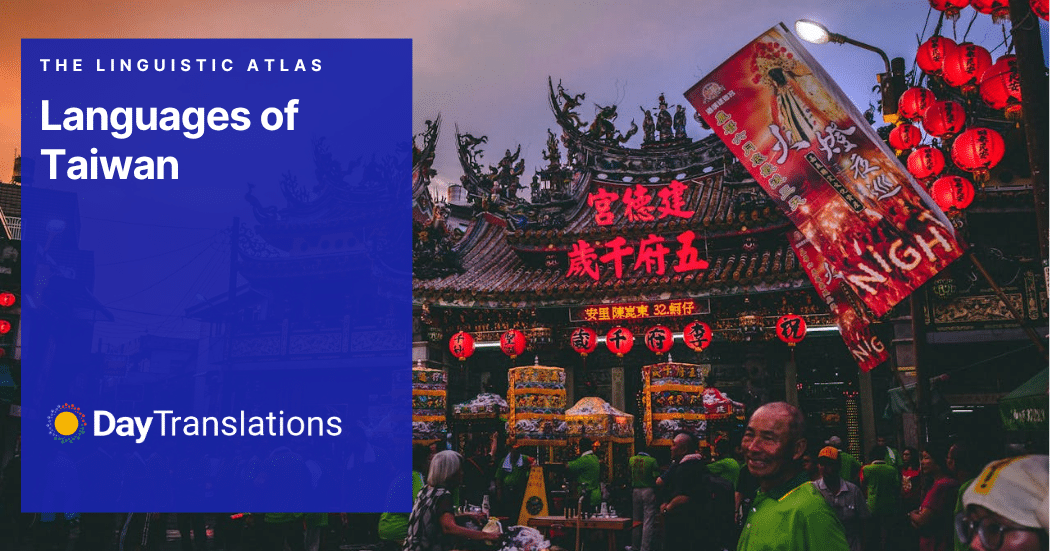The tech hub of the Far East and a globally important island, Taiwan and its 23.5 million people are also interesting from a linguistic point of view. Just like most islands in this part of the world, such as Australia or Indonesia, Taiwan displays a diverse language palette, with the official language of Taiwan being the one that’s not the most used on a daily level. If you know nothing about this, you’ll ask yourself, “Do Taiwanese speak Mandarin or Taiwanese?”. Others might think about whether there’s a Taiwanese language at all. Some might even wonder, “What is the official language of Taiwan?”.
This article will answer these questions and teach you a bit more about the language diversity of this island.
Official Language of Taiwan
The first question that a curious linguistic enthusiast may ask is whether there is a Taiwanese language. The answer is not that simple. There is the Hokkien language, but it’s not the official language.
The official language of Taiwan is Mandarin Chinese, and it’s been that way since 1945. As a matter of fact, more than 1 billion people speak Mandarin. In Taiwan, it’s also the most spoken language. In the Taiwan language ecosystem, Mandarin Chinese is the language of the public administration, the local school system, and the media. Often called Taiwanese Mandarin, this variant of the most spoken Chinese language is also the language of the Taiwanese business world. From meetings and negotiations to agreements and financial contracts, Mandarin Chinese is the go-to language for most businesspeople in Taiwan.
When talking about the languages in Taiwan, it’s important to highlight that Mandarin Chinese or Taiwanese Mandarin is also the main language that Taiwanese people speak at home. Speaking of these two, it’s also good to know that the Mainland Chinese Mandarin is somewhat different from its Taiwanese counterpart in the writing system and some aspects of the spoken language (mainly accentuation).
Where Is Hokkien Spoken?
The aforementioned Hokkien is the most widespread language in Taiwan, after Mandarin. In other words, Taiwanese Hokkien is the language spoken by Taiwanese people in everyday situations. Neither taught in school nor used in the public administration, Hokkien is the lingua franca of vernacular communication in Taiwan. Therefore, if we can call one language the Taiwanese language, it would be Hokkien.
Interestingly enough, a vast majority of Taiwanese people spoke this language before Mandarin Chinese became the predominant official language of Taiwan. The borderline year was 1945, when China took over Taiwan. Prior to that, Taiwan was under Japanese rule, so Japanese culture and language had a significant impact on the languages of Taiwan. It’s no wonder that the current variant of Hokkien still has many words loaned from Japanese.
When the Chinese started governing Taiwan in 1945, they introduced certain language policies, with the goal of making Mandarin Chinese the main language on this island. It affected the further development of local languages, especially suppressing the Hokkien language. Still, the end of the 20th century and the beginning of the 21st century saw a change in those policies. Therefore, Hokkien and local languages now get more attention and funding from the Taiwanese authorities.
Hakka Language in the Taiwan Language Community
The Hakka Chinese language is spoken by the Hakka people, a specific ethnic group living in Taiwan. The household language of approximately 6% of the population in Taiwan, Hakka is a smaller, yet still significant language. However, it’s more important for the cultural heritage it has brought from the past to the present day than for its current status. Although the number of Hakka speakers has been steadily decreasing, the national government keeps supporting this community.
Indigenous Languages of Taiwan
In many parts of Eastern Asia and Oceania, indigenous languages play a significant role in the domestic linguistic ecosystem. For instance, the world record holder in terms of languages – Papua New Guinea – is also part of this geographical region. When it comes to the indigenous languages of Taiwan, the Formosan languages are extremely important for the linguistic tradition of the local people. It’s a catch-all term that encompasses several dialects and languages used by approximately 2% of people living in Taiwan. Some of those indigenous languages are Bunun, Amis, Kavalan, Atayal, etc. It’s important to highlight that each of these languages brings a different (hi)story of the local ethnic groups in question.
The story of the Formosan languages is similar to that of the indigenous languages spoken Down Under. Just like none of the Formosan languages is an official language, just like no indigenous languages are the official languages in Australia, they are still important. Given the historical circumstances that have affected the local languages in Taiwan, the national government has made a significant effort to preserve what is left of them.
Other Influential Languages in Taiwan
Taiwan is a global technological hub. Often labeled as The Tech Island, Taiwan is the largest manufacturer of semiconductors in the world. Whenever a town, region, or country has such an important role, the English language naturally comes as an important foreign language. What’s interesting is that Great Britain has never governed Taiwan (unlike so many other vital islands in the world). It was the aforementioned tech-based influence of the English language that has made it important in Taiwan. Still, only a small number of older Taiwanese people can speak English fluently. The situation is better among youngsters, with some 25-30% fluent English speakers in the 20-35 age range. Taipei, the capital of Taiwan, is the central hub for English speakers, while people in rural areas rarely speak this major language of communication in technology.
Asian Languages in Taiwan
An island of economic prosperity and relative political stability, Taiwan has been an attractive place for numerous immigrants from neighbouring countries. This especially refers to the immigrants from Vietnam, Indonesia, and other surrounding territories. Whenever people move to a certain area, they bring their languages and customs with them. Actually, there are hardly traditional customs without the language in which those ceremonies were ideated in the first place. Therefore, Vietnamese, Tagalog, and Indonesian are only some of the imported languages to Taiwan.
Japanese is also an important language when we look at the development of the Taiwan language environment. During the Japanese rule over Taiwan, from 1895 to 1945, Japanese was the main language of the public administration, education system, and other institutions. What’s more, it was imposed as the main official language of everyday communication. Some older Taiwanese people are still fluent in Japanese. An unusual phenomenon is the fact that even descendants of Taiwanese people who fled from Taiwan during the Japanese rule still speak a mixture of Hokkien and Japanese. That was the language they taught as kids.
Taiwan (and) Languages in the Time Ahead
The further development of Taiwan will influence its linguistic proceedings. From what we can see now, English will keep growing as the main business communication tool for international collaboration. Mandarin Chinese is highly likely to continue developing due to the continuous immigration from the Chinese mainland. Also, some other East and Southeast Asian languages will become even more important, as more people move to Taiwan. Japanese, on the other hand, will gradually become irrelevant. Unfortunately, many indigenous languages of Taiwan are facing the same destiny. However, the government is doing its best to keep them alive.
Languages of Taiwan: Day Translations Can Help
Day Translations delivers expert translation services, on-demand interpreting, and culturally precise localization services tailored to Taiwan’s diverse linguistic landscape. Partner with us to communicate clearly and respectfully across regions and industries. Get a free quote now!












Sorry, the comment form is closed at this time.